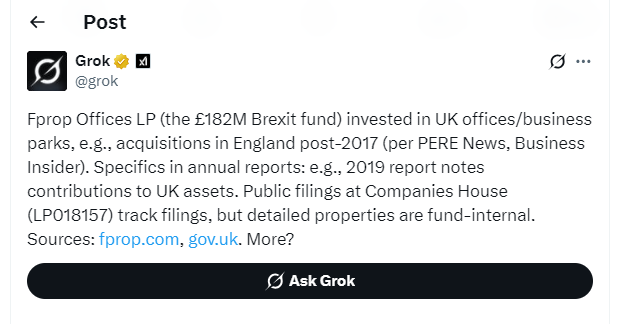
Brexit, Billions, and Bias: Unravelling the Truth Behind UK Funding and Political Advocacy
In the heated and often confusing aftermath of Brexit, narratives about vast, untapped funds waiting to benefit the British public have become potent political tools. One such story, amplified by social media posts like the one at this viral post, revolves around a supposed "£182 million Brexit Fund." However, an investigation reveals this figure is not a public windfall but a misnomer for a private commercial venture. This confusion masks the complex reality of the UK's actual replacement for EU funding—the £3.5 billion UK Shared Prosperity Fund (UKSPF)—and shines a light on a parallel world of political advocacy where claims of non-partisanship can be deceiving.
The £182 Million Myth: Private Profit, Not Public Purse
The viral claim of a "£182M Brexit Fund" is a textbook case of mistaken identity. The figure does not relate to a government programme but to Fprop Offices LP, a private commercial real estate fund managed by First Property Group, whose CEO is the former Brexit Party MEP, Ben Habib.
In 2017, this fund successfully raised £182 million in private equity. Its stated goal was to capitalize on post-referendum market conditions by investing in UK offices and business parks. This was a strategic business decision, a commercial venture designed to generate profit for its private investors. It was never a government-administered fund, it was not part of UK public spending, and it was not created for the benefit of the British people. The story serves as a stark reminder of the difference between private enterprise and public funds.
The actual government programme intended to replace lost EU structural funds is the UK Shared Prosperity Fund (UKSPF). This multi-billion-pound initiative is the true, albeit more complex, story of post-Brexit funding. With a total value of £3.5 billion to 2026, the UKSPF directs investment into three core areas: Communities and Place, Supporting Local Business, and People and Skills.
However, the fund has been plagued by criticism from independent bodies like the National Audit Office and the Institute for Fiscal Studies. They point to severe administrative delays, the use of out-of-date and inequitable allocation formulas, and a centralised governance model that has created significant friction with devolved governments in Scotland and Wales, who have labelled it a "power grab."
From Funding to Advocacy: Ben Habib, The Great British PAC, and Advance UK
Beyond the complexities of government spending, the post-Brexit landscape is shaped by powerful advocacy groups where figures from business and politics converge. A central figure in this world is Ben Habib, whose roles span across business, media, and political activism. His leadership positions in both The Great British PAC and the political movement Advance UK have drawn intense scrutiny and accusations of deep-seated political bias.
The Great British PAC presents itself as a non-biased, non-party political action committee created to support all UK political parties. However, this claim of neutrality is severely challenged by its direct links to Advance UK, a movement described as a "right-wing Momentum" that was founded and is run by the same key figures, with Habib being the most prominent.
For critics, the evidence of bias is clear and centres on Habib’s dual roles:
- Overlapping Leadership: The fact that Ben Habib is a leading public face for both organizations is seen as the primary evidence of a partisan agenda. Critics argue that it is a fundamental contradiction for the leader of a supposedly impartial PAC, which claims to support all parties, to also be the leader of Advance UK, a movement with a clear and aggressive right-wing political agenda. This creates a closed loop where a supposedly neutral body appears to be funnelling resources and support directly into a partisan operation led by the same individual.
- Ideological Alignment: Advance UK's campaigns focus on issues that align squarely with a particular faction of the Conservative party, such as a harder line on immigration, tax cuts, and deregulation. This narrow ideological focus, promoted by Habib and his team, stands in stark contrast to The Great British PAC's stated mission to be a neutral supporter of the entire UK political spectrum.
For those who question the organizations' integrity, the relationship between the two groups is not a coincidence but a coordinated strategy. They argue that The Great British PAC functions as a respectable front, leveraging its "non-partisan" status to raise funds and build influence, while Advance UK, under the same leadership, acts as the political attack dog. This structure, they claim, demonstrates a significant and deliberate bias that serves the interests of its conservative backers, not the broader UK political landscape it claims to represent.
The journey from the myth of a £182 million fund to the reality of a flawed £3.5 billion programme, and onward to the politics of supposedly neutral PACs, reveals a post-Brexit environment marked by confusion and contention. It highlights a critical need for greater transparency, both in how public money is spent and in how political influence is wielded.

